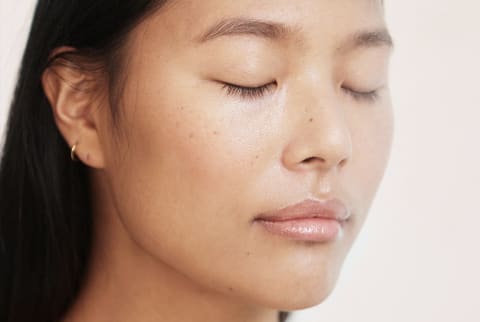Advertisement
3 Nonnegotiable Tips To Naturally Restore Collagen & Keep Your Skin Firm


Are you concerned about plump, firm skin? What about a brighter complexion? Or overall skin inflammation? You need to consider your collagen levels for all of the above.
You see, proper collagen production is essential for a strong skin barrier (collagen is the main structural component of the skin, after all). And when your skin barrier weakens, wrinkles, dryness, and irritation aren't too far behind.
So you want to keep your collagen production up to speed—but, alas, those levels naturally decline as we get older. That's the bad news. The good news is that you can help your body produce its own collagen and protect what you already have!
We suggest starting with these three tips below:
Take collagen supplements
Say it with us: The most effective way to promote collagen production in the skin is to start from within.
And research shows collagen peptides are able to enhance your body's own collagen production1 by stimulating fibroblasts, those same cells that make collagen and elastin to begin with. As a result, those collagen supplements can support skin elasticity and hydration and smooth the appearance of texture2 (like fine lines and wrinkles).
Another double-blind, randomized, placebo-controlled clinical trial found that participants' moisture levels in the skin were seven times higher3 than those who did not take collagen supplements.
Sounds great, doesn't it? However, not all collagen supplements actually deliver on their skin-restoring claims. Make sure to find a formula that features 10 to 20 grams per serving, contains nutrients that support collagen production through other pathways (like vitamin C), and features a clean ingredient list (aka, no artificial colors, sweeteners, flavors, fillers, etc.).
Not sure where to find such a stellar product? We searched high and low to find nine that fit the bill—see here for the best collagen supplements, all backed by a nutrition Ph.D.
Eat antioxidants
Oxidative stress wreaks havoc on your skin health—namely, it leads to collagen degradation and wrinkle formation over time. Antioxidants, however, can neutralize the free radicals that would otherwise cause oxidative stress in the skin.
So, in addition to getting your fill of collagen peptides, make sure you eat a generous amount of antioxidants—especially foods rich in vitamin C. Vitamin C is actually able to promote fibroblast production4, tend to damaged collagen DNA, and regulate collagen synthesis5. Your body literally cannot produce collagen without the antioxidant6, so eat plenty of vitamin C (red bell peppers, broccoli, oranges, etc.).
Some collagen supplements will actually include vitamin C in their formulas to help with collagen synthesis, or you can pair your collagen powder with a trusty vitamin C supplement.
Get some sleep
At the risk of sounding like a broken record: Skin health starts from within! And beauty sleep is very much real: When you lose sleep night after night, that deprivation can induce oxidative stress and lower your antioxidant defenses, making the body (and skin) vulnerable to oxidative damage.
Not to mention, losing sleep increases cortisol (the infamous stress hormone), which can break down collagen over time—research has even demonstrated a link between shut-eye and collagen production7.
A night of poor sleep may result in sallow skin and dark circles, but if you make that a habit, your skin barrier and natural collagen production can actually suffer over time.
Sleep-supporting tips differ for everyone, but experts generally recommend minimizing your screen time, avoiding late-afternoon caffeine, and curating a calming wind-down routine to ensure solid rest. You can find our full list of expert-backed sleep tips here if you need some extra bedtime inspo.
The takeaway
Restoring your natural collagen production is a great investment for your skin health. Not only will focusing on collagen keep your skin taut and firm, but it will also bolster your skin barrier, thus shielding you from skin inflammation and oxidative stress, too.
We repeat: Collagen is the main structural component of skin. It's the literal bedrock of your complexion, so let's treat it with the utmost care it deserves.
7 Sources
- https://www.ncbi.nlm.nih.gov/pmc/articles/PMC3583892/
- https://www.ncbi.nlm.nih.gov/pmc/articles/PMC6835901/
- https://www.ncbi.nlm.nih.gov/pmc/articles/PMC6073484/
- https://www.ncbi.nlm.nih.gov/pubmed/8995268
- https://www.ncbi.nlm.nih.gov/pubmed/18505499
- https://lpi.oregonstate.edu/mic/health-disease/skin-health/vitamin-C
- https://www.nature.com/articles/s41556-019-0441-z